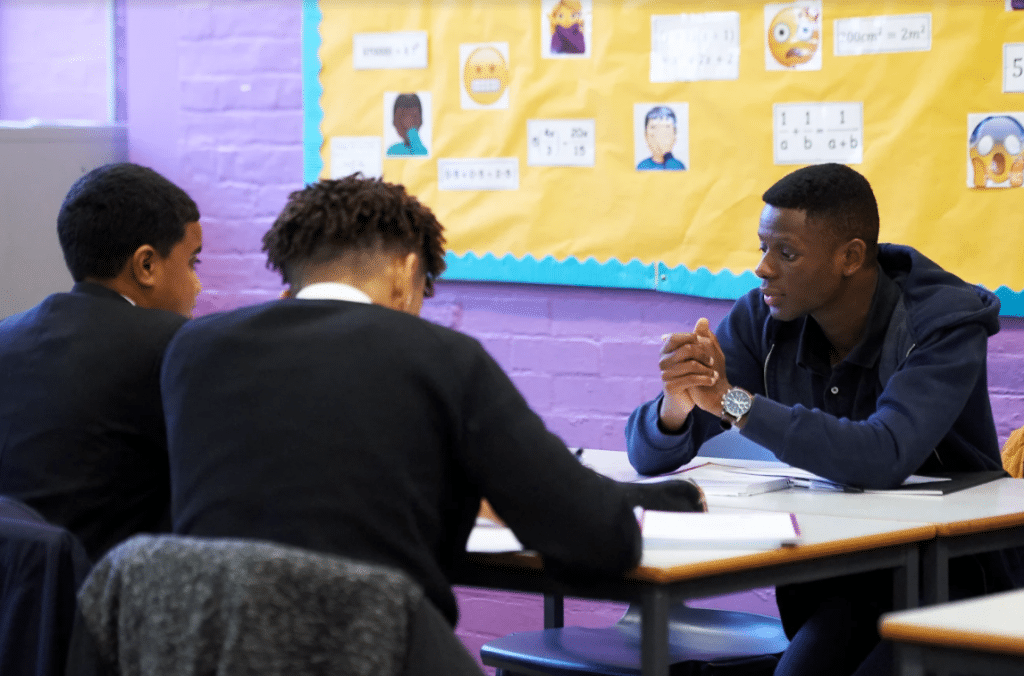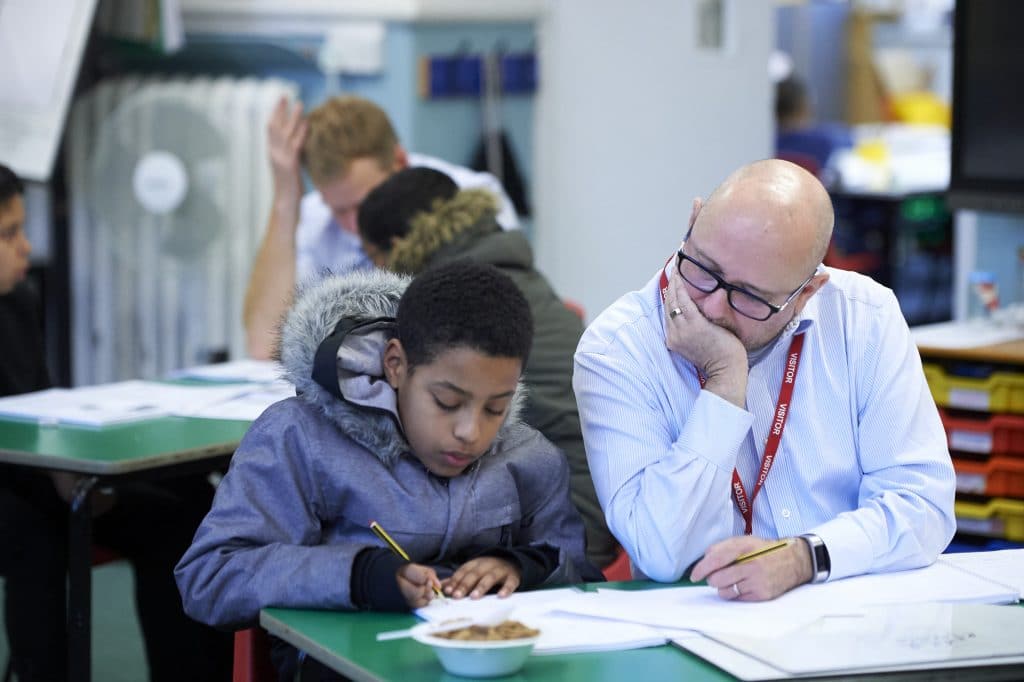Movember reflections – what can we do for our boys?
30 November 2021
Here at Action Tutoring, our central mission is to lay groundwork that can have a positive, long-term impact on the life outcomes of our pupils.
Our volunteers work hard to consolidate their in-class learning and build their confidence in order to improve their attainment when it comes to decisive exams. But children are not just results-producing machines, and academic attainment is not the only important factor at play – mental wellbeing is vital to anyone’s chances at happiness and prosperity in life.
What is Movember?
Every November, the Movember Foundation asks us to consider specifically the challenges faced by men and (crucially for Action Tutoring) boys when it comes to mental health. According to the foundation, one man dies due to suicide every day in the UK, and three in every four UK suicides is male.
Socio-economically speaking, children and adults in the lowest 20% income bracket are two to three times more likely to develop mental health problems than those in the highest, and in 2019 more than 4 million working class men suffered symptoms of poor mental health but chose not to seek professional help. Men, especially men of socio-economic disadvantage, are not talking about their mental health. So what can we do for our boys?
This academic year, there are more than 1,900 pupils registered on Action Tutoring programmes who identify as male. It is imperative in reflecting on the numbers above, and the threat they pose to so many young people we work with, that we are mindful of the ways that we can use our tutoring provision to make a positive difference and empower boys and young men to speak out when they are struggling with their mental health.
Why is it important?
Young men grow up in a world that encourages them to present as strong and competitive, and to hide any vulnerability. This pressure, and the internalised impact it can have when a boy feels he is failing to meet this idealised standard, is a double trap – it not only harms young men’s self-esteem but also discourages them from speaking out for fear of seeming weak to their peers.
Our tutors are well-positioned to undo this expectation and help free boys of their internalised, gendered burden by praising vulnerability and encouraging their pupils to embrace mistakes and learn to learn from them rather than hide from them or shy away from challenges to avoid feeling inferior.
Positive male role models, whose behaviour challenges masculine norms and demonstrates the positive impact this can have on a person’s life, are commonplace within our tutor pool.
We are proud to work with so many sensitive, empathetic men who serve as shining examples for their pupils (not just boys), and this can be especially impactful for the children we work with whose home situations may leave them without a good model for positive, modern masculinity.
One of the best things we men can do here is model behaviour that will help counteract toxic and negative expectations in young boys, as well as encourage this positive behaviour when we see it in pupils.
One example that springs to mind for me in my work as a Programme Coordinator came this September just gone, when I accidentally gave a Year 5 boy the wrong baseline assessment paper to sit, and didn’t realise until 10 minutes in. When I delivered the bad news to the pupil and explained to him that he would have to start again, he cried. This is a crucial moment, as my response to his reaction could either reinforce or help undo ideas he might carry into manhood. So I admitted that I also felt like crying because I’d made a mistake – but grown-ups get things wrong too, and it’s ok to get upset when things don’t go to plan. By sharing this moment, we were both able to pull ourselves together and my young guy finished his correct paper in good time having taken a run at every single question.
Gendered expectations are ingrained into all of us from an early age, but they can be unlearned – the earlier this happens in a person’s life, the better. Many pupils are already beginning to do this for themselves, as evidenced in the rising numbers of young people identifying outside of the gender binary. But thinking beyond binary gender has advantages even for those of us who still chose to identify by one of the traditional categories.
In this sense, broadening the idea of who can be a role model to who can free all of us from the biases that limit what we can do to encourage openness and sensitivity in young men – many of the most fruitful tutor/pupil matches I have seen are when our female tutors work with young boys. We can also be mindful of the materials we use, making sure that a gender-diverse range of authors are referenced in our English sessions, and that maths-related conversations extend beyond football stats when trying to get bored boys onside.
It is important that we are creative, ambitious and unbiased in how we mix-and-match our pupils with their tutors, as one of the best ways to deconstruct limiting gendered expectations is to erase as many lines that divide us as we can.
We are ambitious for our pupils at Action Tutoring, and this must always extend to their wellbeing as well as their academic success – otherwise our efforts may not have the lifelong impact we strive for.
The holistic benefits of tutoring make our sessions a great space to open up boys to the possibilities that come with talking about their feelings and their struggles. Hopefully, we can help to keep the conversation going for everyone long after our boys become men.
Join our mission by following us on social media. It will help us continue our work and raise awareness – our pupils need us more than ever.
The impact of tutoring: Year 7 pupil Medina tells us about her experience on an Action Tutoring programme
24 December 2020

Medina – Year 7 pupil at Lilian Baylis Technology School, Vauxhall, South London
It’s been a strange year for Medina. With the national lockdown coming into force back in March, schools were made to close which meant she missed out on her final few months at primary school, including her SATs exams. That’s a lot to miss, especially for the pupils we work with at Action Tutoring who don’t all have the same access to online and at-home learning as some of their peers.
Now, Medina has just completed her first term of secondary school, as one of the new Year 7s at Lilian Baylis Technology School in Vauxhall, South London. The year groups are in isolated bubbles, which means she hasn’t met any of the older children yet and the full secondary school experience is still to come – plus, there’s a lot of catching up to do.
Along with 19 of her classmates, Medina has been receiving personalised tutoring from one of our volunteers this term. Here, she tells us what it’s been like to get an extra hour’s support in maths from Abigail each week in this time of confusion and transition…
How did it feel coming to secondary school after missing the last six months of Year 6?
I was a little bit nervous because I thought I would forget everything. But I have a good long-term memory and I remembered a lot of the basics from my classes. I forgot a few things, though, and have had to be reminded in my classes now.
We’ve been giving you tutoring in maths. How did you feel about the subject when you got to Lilian Baylis?
My teachers have been good, but now we are learning more things that are harder and some of them do not make sense to me. But I’ve started learning and things are getting easier. Classes have refreshed my memory and I think I am getting better now. I was not as confident but now I feel more certain about my answers.
What’s your favourite subject?
Art is my favourite. It’s a way to express your feelings without talking. You can just put it on the page and tell people how you feel with colours and shapes.
What is your maths tutor Abigail like?
Abigail motivates me and even when I get answers wrong she helps me to get a good understanding about why I got it wrong. She understands where I go wrong and helps me so next time I get it right, and now I see questions that I know I can get right because she has shown me how.
Do you know what Abigail does when she isn’t tutoring?
She said she was a student at university but I can’t remember what she does. I think it’s medicine!
Why do you like her as a tutor?
She is very calm and doesn’t get upset when I get an answer wrong. She keeps working with me until I get it right.
What was she like when you first met her?
She was very nice and she asked me and my classmate what we were struggling with. She then made sure to bring those things up during the lesson. She’s very motivating!
Was there anything in particular you were struggling with that Abigail has helped you understand?
It was really good doing decimals with her. I didn’t know how to say which one is the biggest and the smallest off the top of my head but she’s helped me build my confidence doing that.
How do you feel when your tutoring session ends?
I feel very relaxed because I’ve done all this hard work that I know will pay off at school in my classes and assessments.
Do you know what you want to be or do when you’re older?
I don’t really know, but I really like skateboarding and writing. I’m going to have a workshop soon with a journalist from the Guardian. So I might want to be a journalist, but I’d also maybe like to be a chef. Cooking is like art – you can express yourself through the flavours!
This year, Action Tutoring is expanding to work with more pupils than ever whose education has been affected by the pandemic, including many more Year 7 pupils like Medina. We are proud and inspired by what our volunteers have done this autumn, whether socially distancing in schools or mastering virtual tutoring for the first time. We know so much will now be possible in 2021 but need more tutors to join us if we are to make the necessary impact on our pupils’ lives.
To make a difference to lives of young people like Medina, apply as a volunteer now and start tutoring in January, or become a partner school to see the impact that tutoring can have on pupils.
Partner as a school Become a volunteer
PC Spotlight: A day in the life of a Programme Coordinator
20 November 2020
With autumn term programmes well under way, Programme Coordinator for London, Rhys Handley, takes us through a usual day at work for the Action Tutoring staff keeping programmes on track.

I seem to have joined the Action Tutoring team at the most exciting time possible. The charity is currently undergoing unprecedented and rapid growth, thanks to funds from the newly-introduced National Tutoring Programme, meaning we can provide vital extracurricular tutoring to more disadvantaged pupils in more schools in more parts of the country than ever before. That’s where someone like me comes in – a Programme Coordinator; or Action Tutoring’s boots on the ground, so to speak.
Having volunteered as one of more than 1,000 tutors for the charity in the days before national lockdown, I was hired as a PC in August ahead of the new term. I had already met a few of my now-colleagues in my capacity as a volunteer, so I entered the role with the vaguest notion of what it requires – but I realise now that I had barely scratched the surface and was actually only witnessing the (very rewarding) end-result of juggling innumerable plates, assembling many moving parts, or however you’d like to put it.
So, what have I discovered in the months since – easily the busiest Action Tutoring has ever experienced – and what does that look like for me, and the ever-growing team of PCs working with our partner schools and volunteers across England, in the day-to-day?
Now that my programmes are all up-and-running (a full-time London-based PC like me can expect to have seven schools on their plate each term), a typical day starts pretty early. I’ll jump out of bed well before 7am, scoff a banana and throw back a coffee before hopping on my bike to a school for my first programme of the day. Morning programmes usually start around the 8-8.30am mark and PCs need to be there early.
Every school is unique and so each programme comes with its own ‘personality’, each packed with lively, attentive pupils supported by committed, resilient teachers and school staff.

For our in-school programmes, many of which are still running this term while following each school’s Covid-19 guidance, this is to make sure all our tutors arrive on time and can be matched up with their pupils promptly before the session starts. For our brand-new online programmes, it’s to make sure all the tech is up-and-running in good time so the pupils are able to interact with their tutors via our newly-minted online tutoring platform. In these sessions, the tutors are coming to the pupils from their homes and workplaces, so there’s a lot of fiddly factors for a PC to balance to make sure things go smoothly – it’s a new system with lots of kinks and quirks to get used to, as surely we’re all finding in this increasingly-online mid-pandemic world of ours.
Once a session is concluded, I’ll be back on my bike to my flat (Action Tutoring staff are working from home for the most part, like so many others) where I’ll settle in at the dining table with a piping hot cafetière of java to crack on with any number of intricate, but essential, administrative tasks. This usually includes answering emails and fielding calls from schools and tutors, helping out with volunteer training seminars on Zoom, plugging in and processing pupil attendance and attainment data to keep up on our rigorous record-keeping, checking tutor documents to clear DBS checks, and if there’s time, taking 15 minutes to catch up with some of my wonderful colleagues on a Google Hangout to check in and make sure everyone is doing ok.
You get to see these children’s ability, confidence, self-esteem and joy for learning grow in real time and, ultimately, that is the real privilege that comes with doing the job of a PC.
Two or three hours of this will fly by and then, after lunch, it’s back on my bike to an afternoon programme. Every school is unique and so each programme comes with its own ‘personality’, each packed with lively, attentive pupils supported by committed, resilient teachers and school staff.
All of those tricky admin tasks, which do tend to build up, are undoubtedly worth it because they all so clearly feed directly into that moment when a tutor is working with a pupil and you see them click on to something they’d been struggling to understand in class. You get to see these children’s ability, confidence, self-esteem and joy for learning grow in real time and, ultimately, that is the real privilege that comes with doing the job of a PC.
Same again tomorrow? Absolutely.
If you are interested in having a PC like Rhys coordinating tutoring sessions at your school, please enquire about partnering with us below.





